Events
Economic Security Research Program (ESRP) at the Research Center for Advanced Science and Technology (RCAST) at The University of Tokyo, along with the NATO HQ and the Royal Danish Embassy Tokyo (NATO Contact Point Embassy), will co-host the "NATO-Japan Symposium 2024: Partnership in Uncertain Times."
Following the "NATO-Japan Symposium 2023: Emerging Security Challenges," we will once again convene experts from around the world to RCAST, The University of Tokyo to discuss how partner countries can collaborate with each other in the era where uncertainty reigns.
This year, we have the privilege of welcoming the Swedish Defense Minister to make a keynote speech. This will be followed by a discussion among NATO HQ experts, numerous Ambassadors (EU, Norway, Denmark, Romania), and Japan's Parliamentary Vice Minister of Defense, among others.
We will focus on 3 topics during the discussions. (1) Interconnectedness of the Euro-Atlantic and the Indo-Pacific; (2) Navigating uncertain times following the 2024 elections; New government, new threats, new responses; and (3) The Future of NATO-Japan and IP4 Partnership.
- Date Tuesday, December 3, 2024, 15:00-18:30 (Registration begins at 14:00)
-
Place
ENEOS Hall, Building #3-S, Komaba II Campus, Research Center for Advanced Science and Technology, The University of Tokyo
4-6-1 Komaba, Meguro-ku, Tokyo 153-8904 JAPAN [Access](https://www.rcast.u-tokyo.ac.jp/en/access.html) - Fee Free
-
Speakers
15:00 - 15:05 Opening Welcome [5 mins]
Masakazu Sugiyama (Director, RCAST, The University of Tokyo)
Pietro De Matteis (Programme Officer for the Indo-Pacific Engagements Section, Public Diplomacy Division (PDD), NATO HQ)
Kazuhiko Kobayashi (Parliamentary Vice-Minister of Defense, Japan)
15:05 - 15:30 Keynote Speech: Swedish perspective on NATO [25 mins]
Keynote speech (5-10 mins)
H.E. Pål Jonson (Minister for Defence, Sweden)
Moderated discussion / Q&A (15-20 mins)
Akira Igata (Project Lecturer, RCAST, The University of Tokyo)
15:30 - 16:20 Session 1: Interconnectedness of the Euro-Atlantic and the Indo-Pacific [50 mins]
Panelists
Junjiro Shida (Associate Professor, Meio University) [Okinawan perspective]
Pietro De Matteis (Programme Officer for the Indo-Pacific Engagements Section, Public Diplomacy Division (PDD), NATO HQ) [NATO perspective]
H.E. Jean-Eric Paquet (Ambassador, EU Delegation to Japan) [EU perspective]
Henrik Landerholm (Swedish National Security Advisor) [European perspective]
[Moderator]
Jakub Janda (Director, European Values Center for Security Studies)
16:20 - 16:40 Coffee break
16:40 - 17:30 Session 2: Countering threats of disinformation [50 mins]
Amy Ertan (Cyber and Hybrid Policy Officer, NATO HQ) [NATO perspective]
Masakazu Takamori (CEO, Japan Nexus Intelligence) [Japanese perspective on disinformation threats and responses]
Maya Sobchuk (Project Academic Specialist, RCAST, The University of Tokyo) [China-Russia nexus in disinformation]
Aaron D. Snipe (Minister Counselor for Political Affairs, U.S. Embassy Tokyo) [Nexus of the Euro-Atlantic and the Indo-Pacific perspective]
[Moderator]
H.E. Ovidiu-Alexandru Raețchi (Ambassador, Embassy of Romania to Japan)
17:30 - 18:20 Session 3: The Future of NATO-Japan and IP4 Partnership [50 mins]
Takeshi Sakade(Professor, Graduate School of Economics, Kyoto University) [Japanese perspective]
Bo Ram Kwon (Research Fellow, Korea Institute for Defense Analyses (KIDA)) [Korean perspective]
Corey Wallace (Associate Professor, Kanagawa University) [NZ perspective]
Claire Elias (Minister-Counsellor (Political), Australian Embassy Tokyo) [Australian perspective]
[Moderator]
H.E. Kristin Iglum (Ambassador, Norwegian Embassy in Tokyo)
18:20 - 18:30 Closing Remarks
H.E. Jarl Frijs-Madsen (Ambassador, Royal Danish Embassy in Japan) - Language English (Japanese-English simultaneous interpretation is provided)
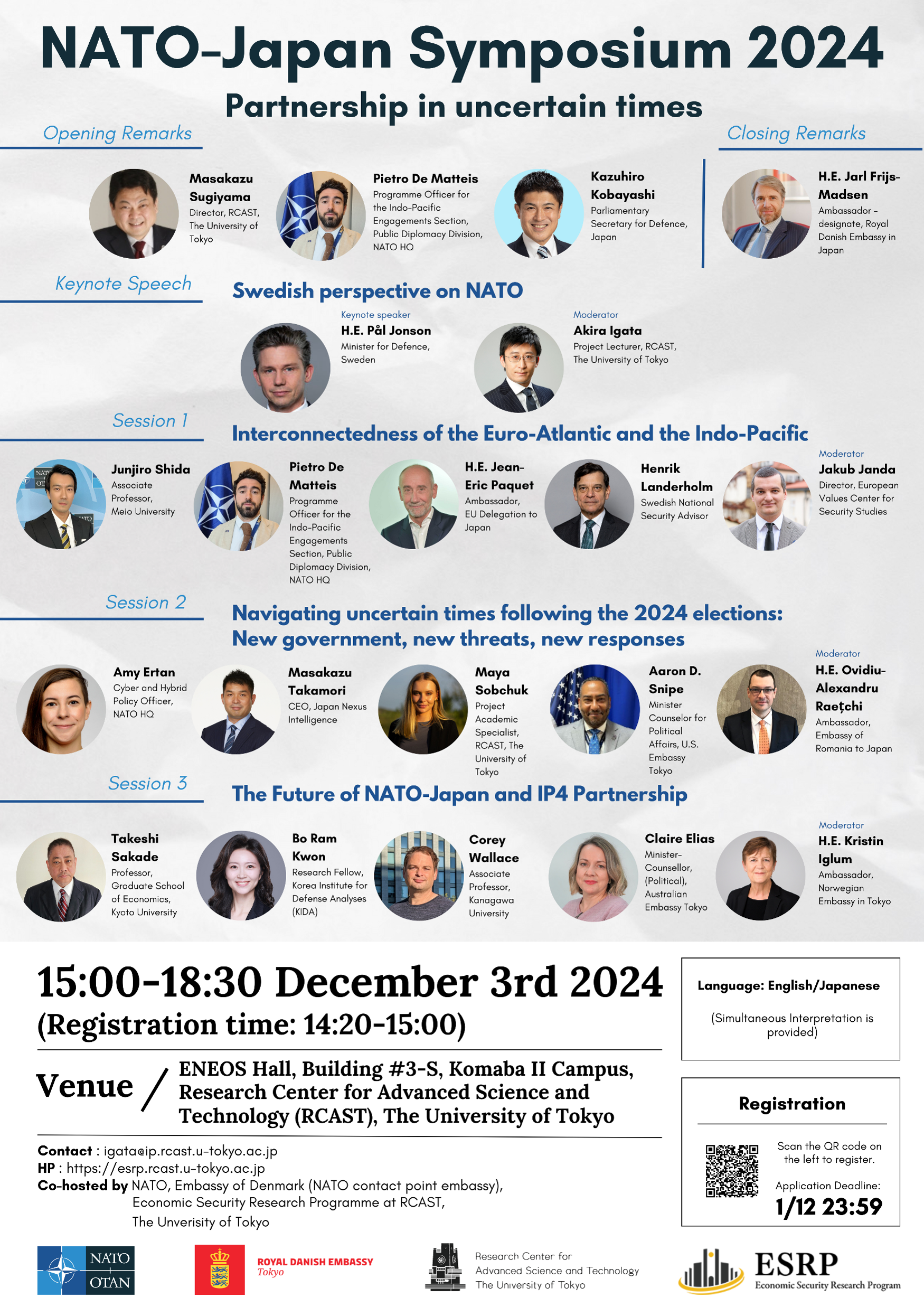
Economic Security Research Program (ESRP) at the Research Center for Advanced Science and Technology (RCAST) at The University of Tokyo, along with the NATO HQ and the Royal Danish Embassy Tokyo (NATO Contact Point Embassy), will co-host the "NATO-Japan Symposium 2024: Partnership in Uncertain Times."
Following the "NATO-Japan Symposium 2023: Emerging Security Challenges," we will once again convene experts from around the world to RCAST, The University of Tokyo to discuss how partner countries can collaborate with each other in the era where uncertainty reigns.
This year, we have the privilege of welcoming the Swedish Defense Minister to make a keynote speech. This will be followed by a discussion among NATO HQ experts, numerous Ambassadors (EU, Norway, Denmark, Romania), and Japan's Parliamentary Vice Minister of Defense, among others.
We will focus on 3 topics during the discussions. (1) Interconnectedness of the Euro-Atlantic and the Indo-Pacific; (2) Navigating uncertain times following the 2024 elections; New government, new threats, new responses; and (3) The Future of NATO-Japan and IP4 Partnership.
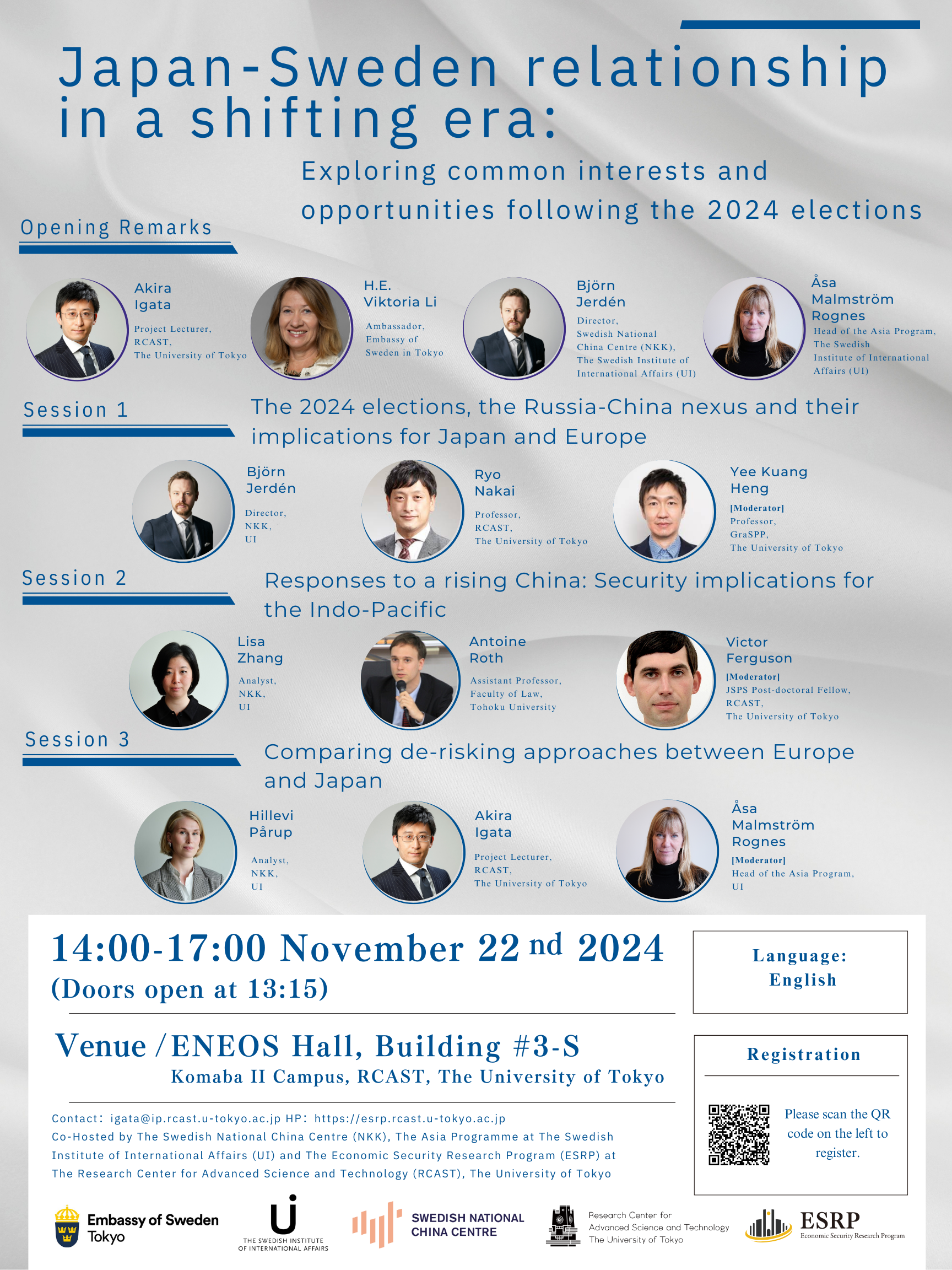
The Economic Security Research Program (ESRP) at The Research Center for Advanced Science and Technology (RCAST), The University of Tokyo and The Swedish National China Centre (NKK) and The Asia Programme at The Swedish Institute of International Affairs (UI) will co-host a symposium, with a backing from the Embassy of Sweden in Tokyo, titled “Japan-Sweden Relationship in a shifting era: Exploring common interests and opportunities following the 2024 elections.”
This symposium will bring together Swedish and Japanese experts on security and economic issues to discuss: (1) How Sweden and Japan perceives the impact of various elections that have taken place in 2024 and the increasing coordination between China and Russia; (2) How Sweden and Japan are responding to the rise of China; and (3) Comparative approaches towards de-risking between Europe and Japan
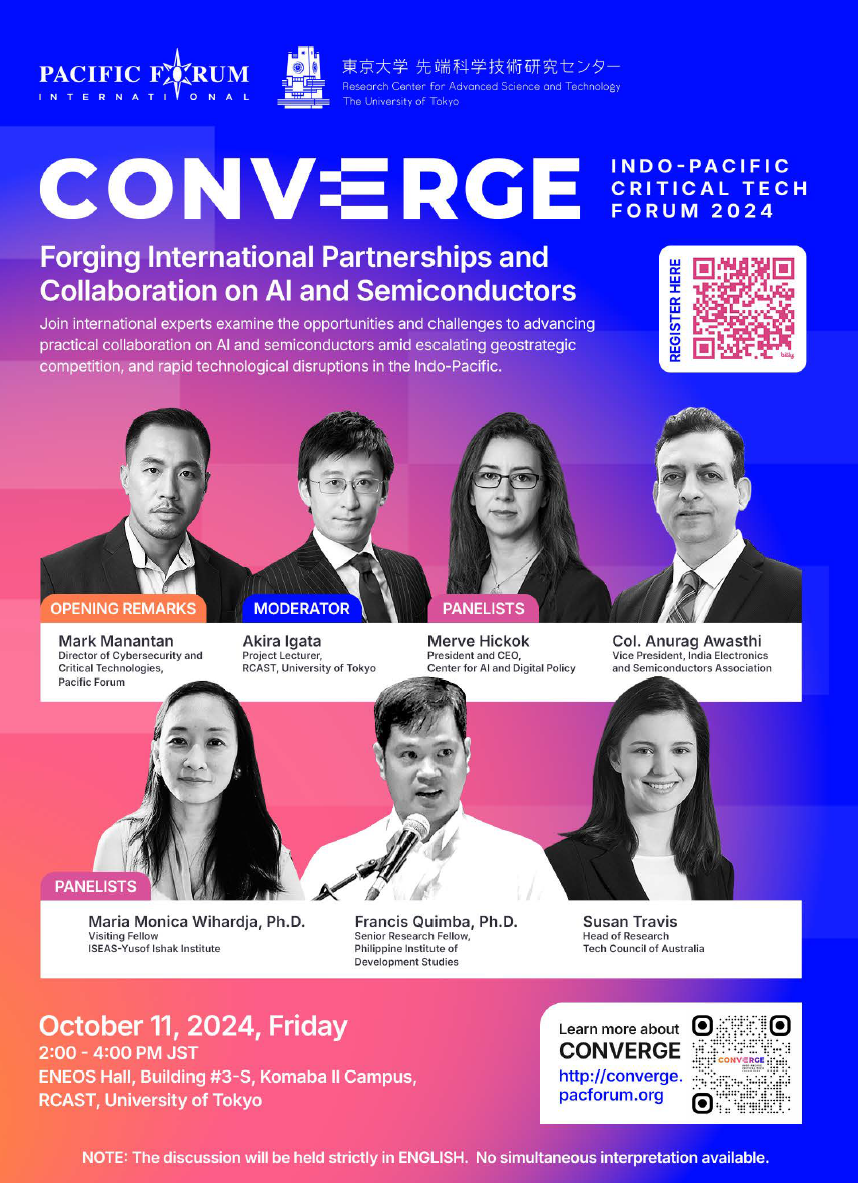
The Economic Security Research Program (ESRP) at RCAST, The University of Tokyo and Pacific Forum will co-host a symposium titled "CONVERGE: Forging International Partnerships and Collaboration on AI and Semiconductors" from 14:00-16:00 on Oct.11.
This symposium will bring together experts from 5 countries in the Indo-Pacific - U.S., Australia, India, Singapore, and the Philippines - to discuss how this region can collaborate better on issues related to AI and semiconductors.
We will share some of the outcomes from the closed discussions, where we examined the challenges and opportunities facing different CET actors operating in the Indo-Pacific related to AI and semiconductors. This will allow for the identification of the means to identify best practices for enhancing Indo-Pacific tech cooperation while building trust between existing stakeholders.
The language of this symposium will be in English. Please note that there is NO simultaneous interpretation. Pre-registration required.

Taiwan has become a global powerhouse in cutting-edge semiconductor manufacturing and a driving force in the next generation of AI revolution. However, due to its dynamic economic relationship and tense military relations with China, the high-tech island nation has found itself at the forefront of potential global conflict zones since the escalation of the techno-geopolitical era of comprehensive US-China competition.
As economic security becomes an increasingly important element of national security, Taiwan’s experience offers important insights into how the People’s Republic of China (PRC) has advanced its technological power. At the event, Dr. Jeremy Chih Cheng Chang, a research fellow and Director of Semiconductor Policy at DEST, a new launched public think tank in Taiwan, will explain the evolution of Taiwan's economic security framework, exploring historical perspectives and regulatory insights, and discussed lessons learned for international allies.
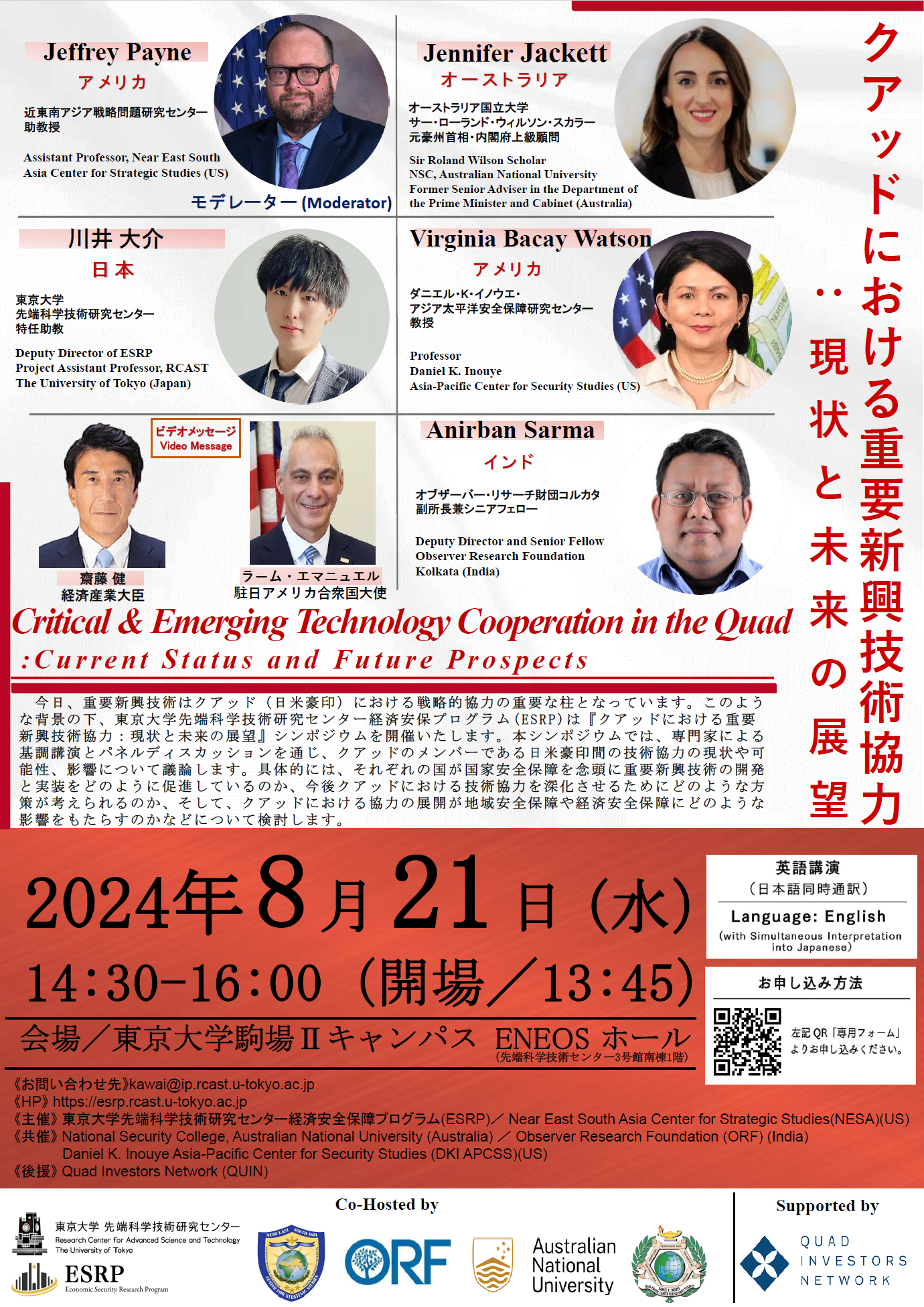
"Critical & Emerging Technology Cooperation in the Quad" symposium aims to explore the technological cooperation among the four Quad countries—the United States, Australia, India, and Japan—and its impact on regional and economic security. This event will feature keynote speeches and panel discussions by experts, focusing on how each Quad member is promoting the development and implementation of critical and emerging technologies with national security in mind. The discussions will also consider measures to deepen this cooperation and examine the Quad's efforts at the forefront of technological innovation, along with their future prospects.
This event is co-hosted by the Economic Security Research Program (ESRP) at the Research Center for Advanced Science and Technology (RCAST), The University of Tokyo (Japan)and the Near East South Asia Center for Strategic Studies (NESA) (US) in collaboration with the National Security College, Australian National University (Australia); the Observer Research Foundation (ORF) (India); the Daniel K. Inouye Asia-Pacific Center for Security Studies (DKI APCSS) (US), and is endorsed by the Quad Investors Network (QUIN).
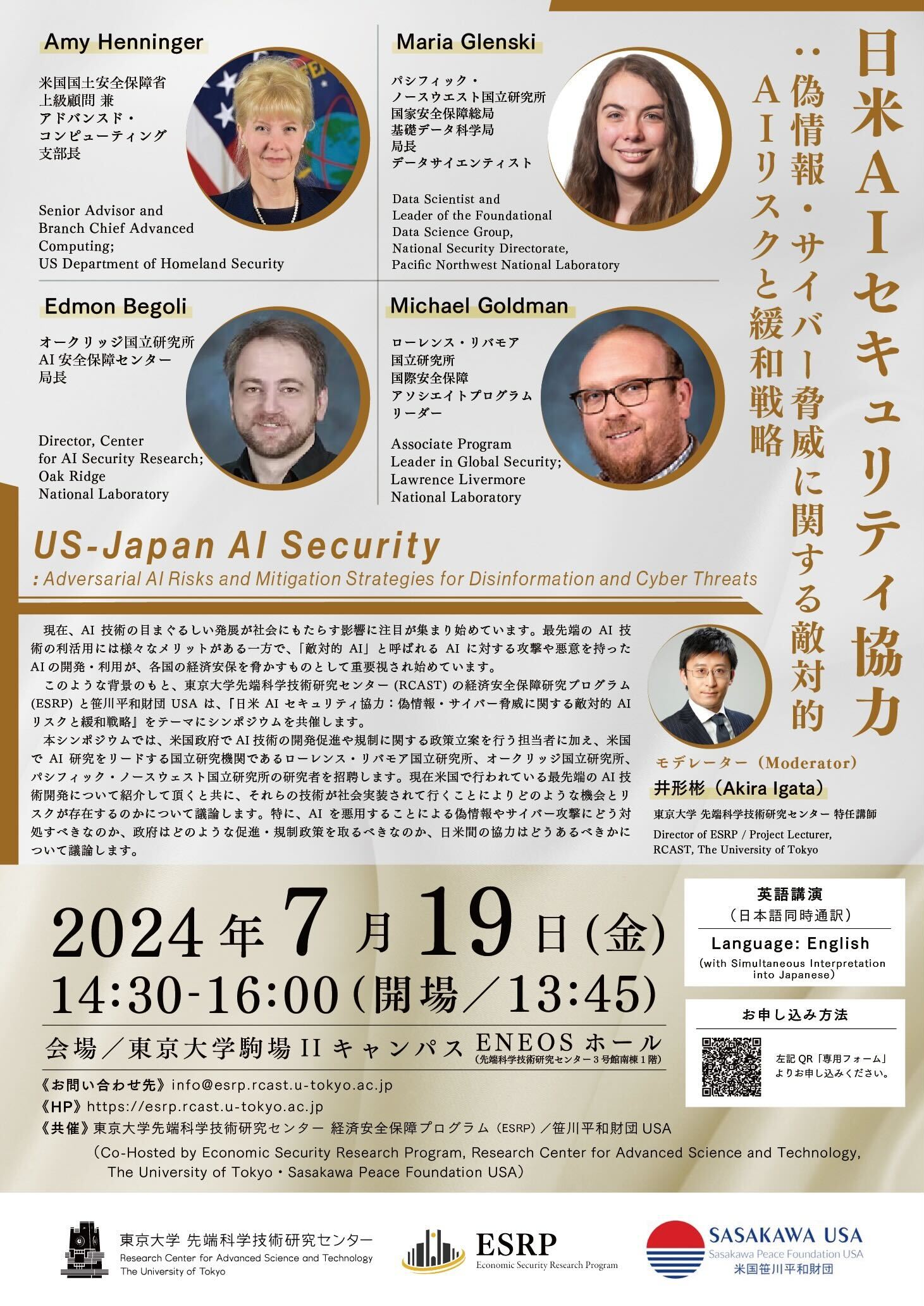
Today, there is growing attention on societal impacts of the rapid development of Artificial Intelligence. While the utilization of cutting-edge AI technology offers various advantages, the development and use of "adversarial AI," or AI with malicious intent or attacks against AI, has emerged as a serious economic security risk for nations around the world.
Against this backdrop, the Economic Security Research Program (ESRP) at RCAST, the University of Tokyo and the Sasakawa Peace Foundation USA will co-host a symposium titled "US-Japan AI Security: Adversarial AI Risks and Mitigation Strategies for Disinformation and Cyber Threats".
The symposium will feature speakers from the U.S. government in charge of developing policies to promote and regulate AI technology development, as well as researchers from Lawrence Livermore National Laboratory (LLNL), Oak Ridge National Laboratory (ORNL), and Pacific Northwest National Laboratory (PNNL), leading national research institutes for AI research in the United States. They will introduce cutting-edge AI technology developments in the U.S. and explore risks and opportunities these technologies will bring to our society. In particular, we will discuss how to deal with AI-enabled disinformation and cyberattacks, ideal promotion and regulatory means for the government, and the future of Japan-US cooperation on AI related issues.
The event report is here.
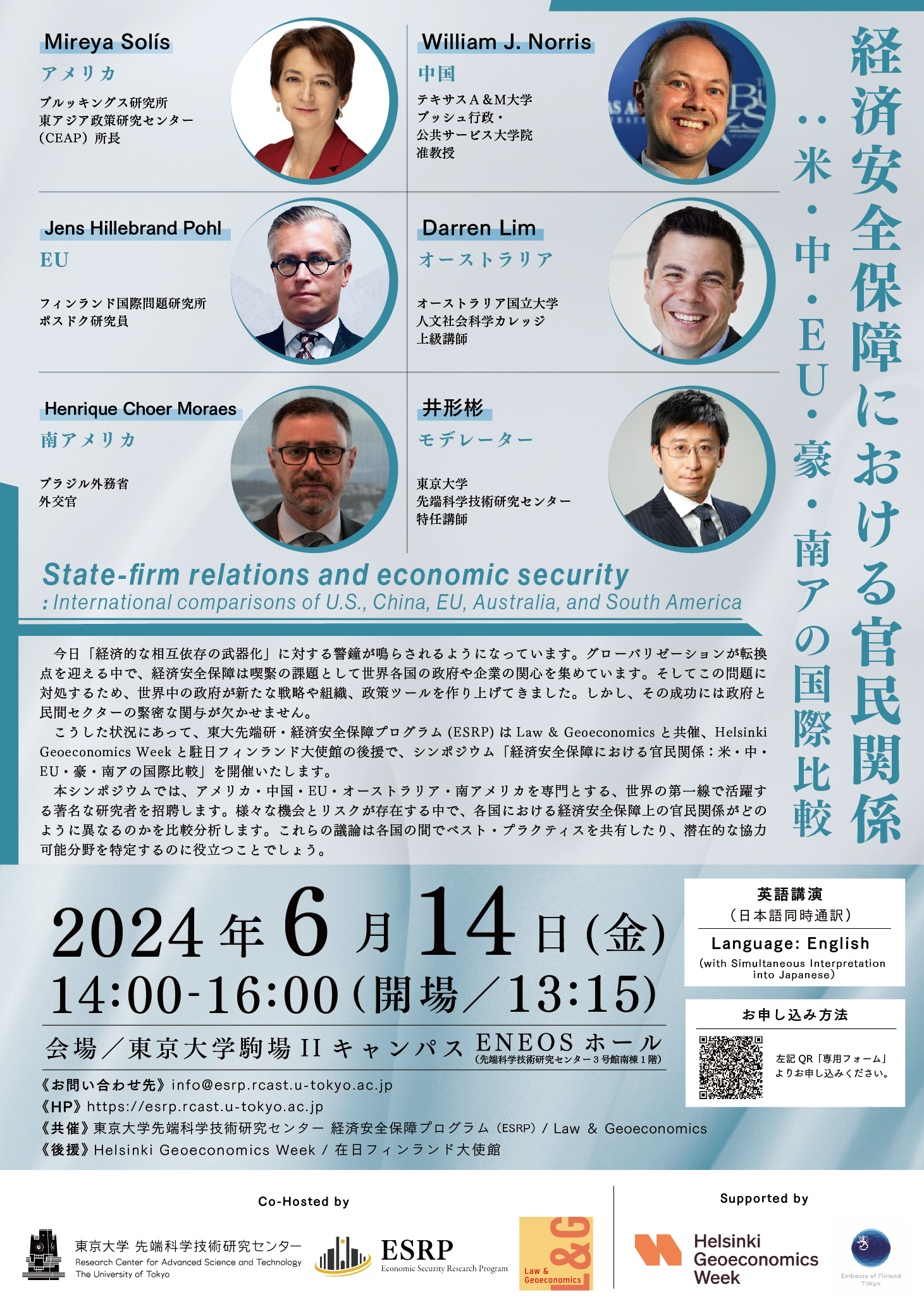
Economy security has recently become a central issue of concern for governments and businesses around the world. Various governments have created new strategies, institutions, and tools to address these new challenges. However, the private sector involvement is critical in the effective implementation of these government policies.
Under these circumstances, the Economic Security Research Program (ESRP) at RCAST, The University of Tokyo and Law and Geoeconomics will convene a symposium titled _State-Firm Relations and Economic Security: International Comparisons of U.S., China, EU, Australia, and South America_, with the support of Helsinki Geoeconomics Week and the Embassy of Finland.
This symposium will bring together experts on economic security from the U.S., China, EU, and South America to compare how state-firm relations differ in regions around the world, especially given the rise of economic security risks and opportunities. This will allow for the sharing of best practices as well as identifying potential areas of cooperation among countries.
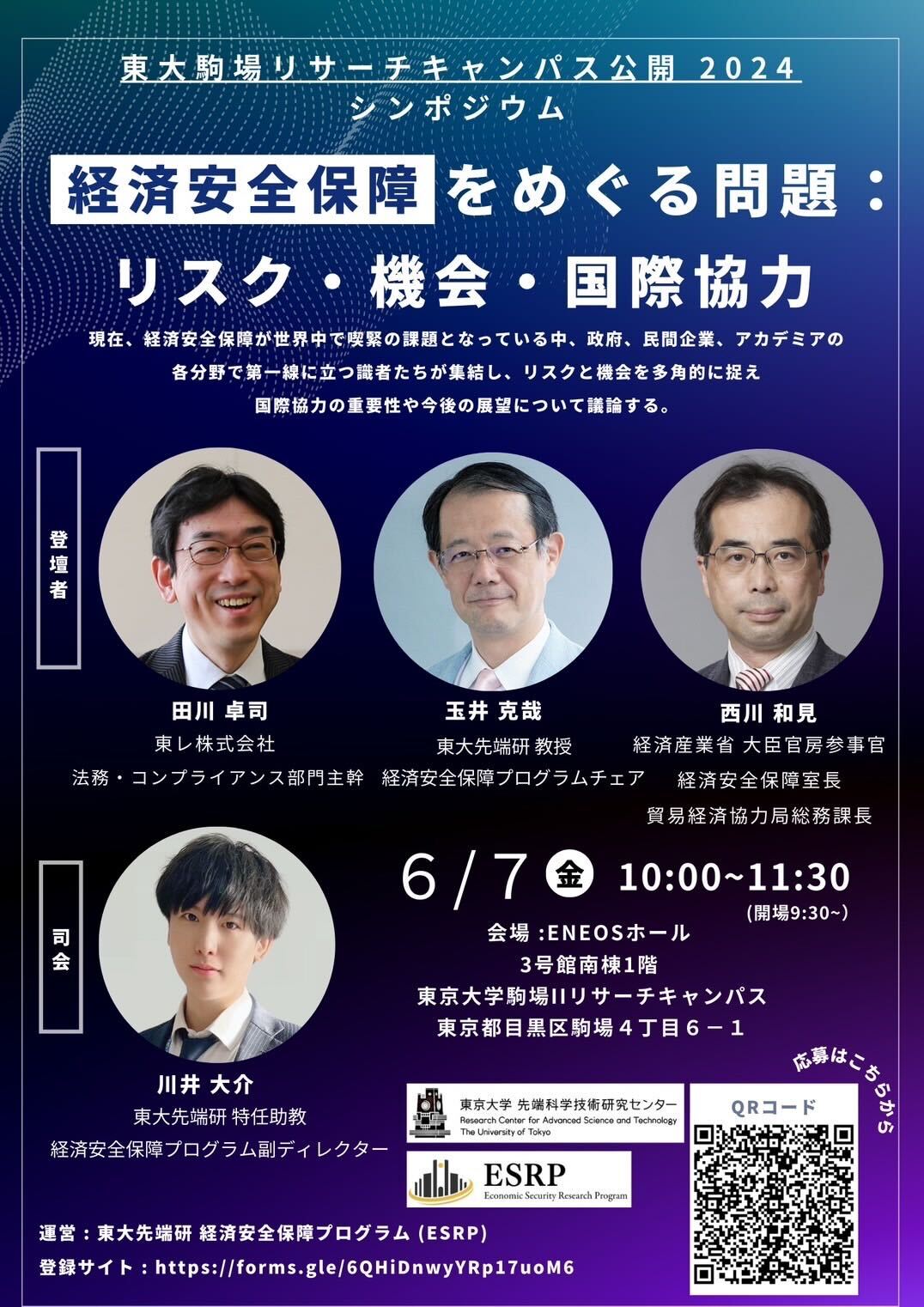
The Economic Security Research Program (ESRP) at the University of Tokyo's Research Center for Advanced Science and Technology (RCAST) will host a symposium "Economic Security: Risks, Opportunities, and International Cooperation" as part of RCAST's Open Campus.
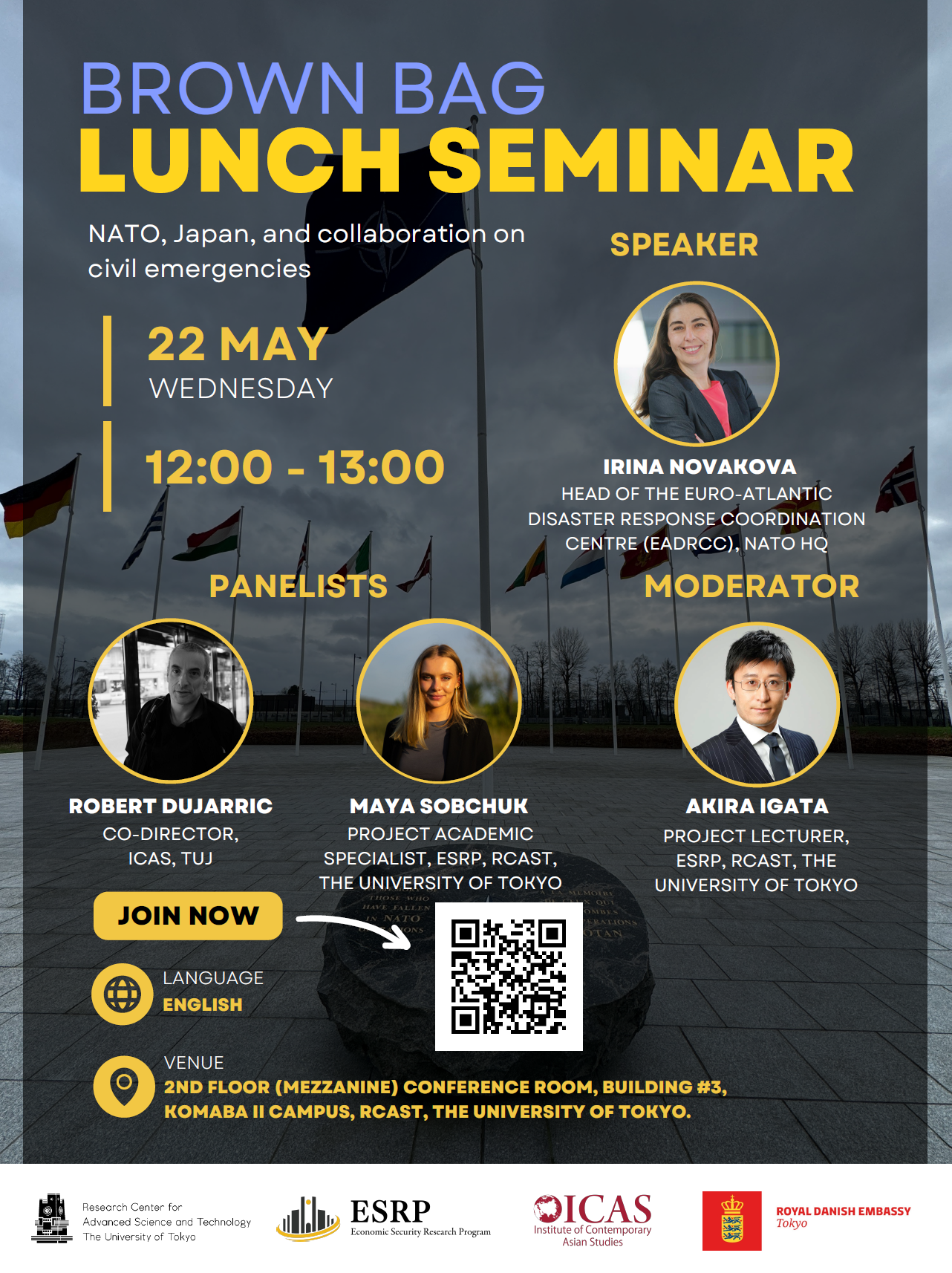
The Economic Security Research Program (ESRP) at the Research Center for Advanced Science and Technology (RCAST), The University of Tokyo and the Institute of Contemporary Asian Studies (ICAS) at Temple University, Japan Campus (TUJ), co-host a brown bag lunch seminar featuring Irina Novakova, the Head of the Euro-Atlantic Disaster Response Coordination Centre (EADRCC), NATO HQ, with the support of Royal Danish Embassy, Japan.
EADRCC is NATO's principal mechanism to respond to civil emergencies. Ms. Novakova will first give a speech addressing NATO's work on cooperative security, which covers cooperation with Japan and working to support partners build up their resilience and security. She'll also focus on examples from support for Ukraine, cooperation on disaster response, and support for building partners' defence capacities.
Her introductory remarks will be followed by comments from two expert panelists. Robert Dujarric (ICAS, TUJ) will give us a historical perspective, while Maya Sobchuk (RCAST, The University of Tokyo) will touch upon the issue of strategic communication and disinformation in disaster responses. Akira Igata will be the moderator, while also commenting from the angle of economic security policies. This will be followed by a moderated discussion and Q&A with the audience.
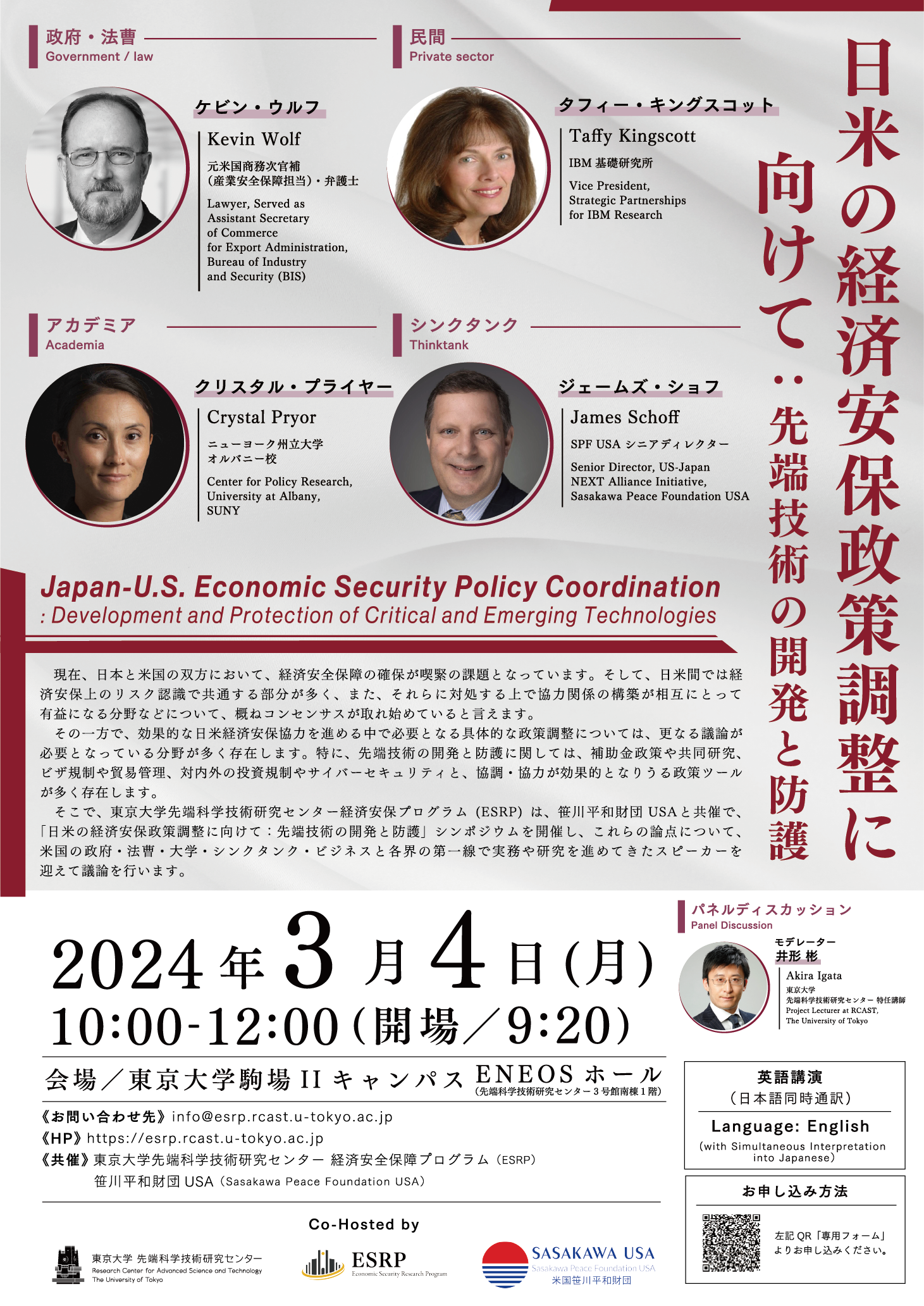
Economic security has become one of the top priority areas for policy-makers in both Japan and the United States. Furthermore, there is now a general consensus between the two countries regarding the perception of shared economic security risks as well as in areas where cooperation among allies and partners in addressing these risks would be mutually beneficial.
However, there are areas of specific policy coordination that require further discussion to promote an effective U.S.-Japan economic security cooperation. The development and protection of critical and emerging technologies is a top concern among them, where coordination and cooperation in using numerous policy tools would be effective in furthering the national interests of both countries. These include: subsidies; joint R&D; visa regulations; export controls; inbound and outbound investment screening mechanisms; and cyber security.
In order to discuss these issues, the Economic Security Research Program (ESRP) at RCAST, The University of Tokyo and Sasakawa Peace Foundation USA will co-host a symposium titled "Japan-U.S. Economic Security Policy Coordination: Development and Protection of Critical and Emerging Technologies" on March 4th. This symposium will feature speakers from the U.S. who have been at the forefront of practice and research in these issues in the government, legal practice, academia, think tank, and business sectors.
Mailing List
The earliest information about the latest event will be delivered.
Please register from the button below.

